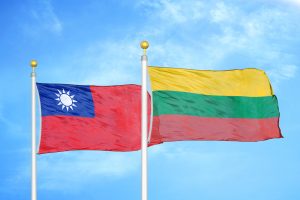A diplomatic row between China and Lithuania broke out earlier this week, with China ordering Lithuania to withdraw its ambassador in Beijing on Tuesday. China stated that it would do the same with its ambassador in Lithuania.
The diplomatic row centers around plans by Taiwan to open a new diplomatic office in Lithuania, which also intends to open a trade office in Taiwan this fall.
The move does not mean that Taiwan will establish official diplomatic relations with Lithuania. The new office would still be a representative office and not a formal embassy or consulate, even if it would de facto serve the functions of an embassy. However, based on its statement, China seems to be angered that the new office would be called the Taiwanese Representative Office in Lithuania, rather than the “Taipei Representative Office” or some variant thereof, as is often the case with Taiwan’s representative offices in countries with which it does not have formal diplomatic relations.
Plans by Taiwan to open diplomatic offices abroad have led to reprisals from China before. In February, plans by Taiwan to open a new diplomatic office in Guyana were scrapped one day after they were announced due to displeasure from Beijing.
Similarly, changing the name of diplomatic offices to feature “Taiwan” instead of “Taipei” in the name has been used to signal strengthening relations between Taiwan and other countries. In 2017, the name of Taiwan’s non-governmental agency for handling relations with Japan was changed to the Taiwan-Japan Relations Association after 45 years as the Association of East Asian Relations. The Taiwan Diplomatic Review Act, proposed by U.S. House Representatives Brad Sherman and Steve Chabot as a bipartisan move in May, has as one of its provisions including “Taiwan” in the official name of representatives offices in the United States. (The name in use now is the Taipei Economic and Cultural Representative Office.)
Taiwan currently only has formal relations with 15 countries, including the Vatican City, its sole diplomatic partner in Europe. That being said, Taiwan and central European countries have signaled their intentions to strengthen ties in recent months through vaccine diplomacy. In June, Lithuania announced that it would be donating 20,000 vaccines to Taiwan. This was followed in July by Slovakia announcing its own donation of 10,000 vaccines to Taiwan and Czechia announcing a donation of 30,000 vaccines.
Vaccine donations from such countries have been welcomed in Taiwan. In particular, face masks featuring the Lithuanian flag alongside the Formosan black bear – a species of bear indigenous to the island and a symbol of Taiwan – have become a popular item available at convenience stores across Taiwan, alongside flags thanking the U.S. and Japan for vaccine donations.
China has stepped up pressure on Taiwan’s remaining diplomatic allies to break ties with Taipei in favor of recognizing Beijing in past years, having previously refrained from poaching diplomatic allies of Taiwan during the Ma Ying-jeou administration. The opposition KMT, which leans toward political unification with China, has criticized the Tsai administration as having failed to maintain diplomatic relations with longstanding allies of Taiwan. As such, the Tsai administration has sought to tout the opening of new diplomatic offices abroad as a foreign policy accomplishment – including with Somaliland, another unrecognized state, in 2020.
In particular, the Tsai administration frames the opening of new representatives’ offices as a diplomatic breakthrough, reversing the trend of Taiwan’s international marginalization. This is not likely to prevent criticisms from the KMT that the Tsai administration has not done enough to maintain diplomatic ties with allies, including accusing the Tsai administration of attempting to foist untested domestically-manufactured vaccines onto diplomatic allies.
The Lithuania incident is notable as the first time that China has recalled an ambassador from a European Union (EU) member state since the EU’s establishment in 1993 and it follows criticisms of China from the EU on human rights grounds. Although Chinese state-run media has framed the EU as backing Lithuania in the dispute, EU countries themselves are divided on what stance to take toward China, as reflected in attempts to pass the Comprehensive Agreement on Investment (CAI) that floundered earlier this year. The push to pass the CAI would have likely strained relations with the Biden administration, but initial moves to legislate the agreement eventually stalled.
Strengthening relations between Taiwan and Central European countries may be, in part, aimed at diplomatic signaling where these countries stand vis-a-vis tensions between the U.S. and China. That is, indicating support for Taiwan may be an indirect means of signaling alignment with Western countries that back Taiwan, such as the United States.
At the same time, Taiwan’s trading relationship with Central European countries is not insignificant. Czechia represented the fourth largest destination for Taiwanese investment in 2019. Central European countries such as Slovakia and Lithuania may stand to economically benefit from strengthening trade relations with Taiwan and perhaps this is a factor in their decision to build stronger ties with Taiwan. To this end, other Central European countries may follow suit in aiming to strengthen ties with Taiwan. This may explain the strength of China’s response against Lithuania, which is perhaps intended to prevent such a trend from developing.

































